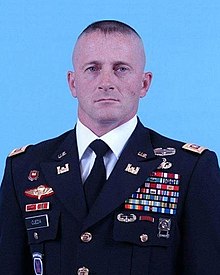Richard Ojeda
Richard Ojeda Neece II (* 25. September 1970 in Rochester , Minnesota ) is an American politician of the Democratic Party and former Major of the United States Army . He was a member of the West Virginia Senate from December 2016 to January 2019 . In the 2018 US House of Representatives election , he was a Democratic candidate for the third constituency in that state .
Career
Training and military career
Ojeda grew up in Minnesota and has Mexican ancestry. His grandfather immigrated illegally to the United States at the time. After graduating from high school in 1988, he joined the United States Army , where he was a member for 24 years. He later earned a university degree from Webster University . As a member of the armed forces , he was stationed in various countries for several years, including Germany . He completed several assignments in Iraq and Afghanistan , most recently as a major . In 2013 Ojeda left the armed forces with several awards such as the Bronze Star Medal and worked as a teacher at a high school in his adopted home of West Virginia .
Political activity
After the end of his military career, Ojeda set his sights on a political career. Ojeda belongs to the Democratic Party , which was already close to his parents. In 2014 he failed his first candidacy for the US House of Representatives. In 2016, he successfully ran for a seat in the West Virginia Senate . As a state senator, he campaigned for the legalization of cannabis use for medical purposes and introduced a bill to that effect, which passed both houses of the state legislature in April 2017 and was signed by Governor Jim Justice . Furthermore, at the end of 2017 he called for higher salaries for teachers and criticized the plans of the government of Republican Governor Jim Justice as inadequate.
Despite being a Democrat, Ojeda voted for Republican candidate Donald Trump in the 2016 US presidential election , who won West Virginia by over forty percentage points. Ojeda based his vote on the assumption that Trump would be better for the economy in coal-rich West Virginia. However, he publicly regrets his vote and declared at the beginning of 2018 that Trump, as US President, had done nothing useful for West Virginia and was not interested in the everyday problems of the population. Ojeda voted for Bernie Sanders during the Democratic presidential primary election .
After Republican MP Evan Jenkins declared in 2017 that he would not stand for re-election and instead run for the United States Senate , Ojeda announced that he would be running for its seat in the US House of Representatives . At the Democratic Primary in May 2018, he prevailed against several competitors and was nominated as his party's candidate. Ojeda financed its election campaign exclusively with small donations from supporters from the population and local trade unions . He refused funds from companies and lobbyists . Thematically, he called for more investment in rural areas and government measures to reduce costs in the health sector. In particular, the pharmaceutical industry accused Ojeda of enriching itself at the expense of patients through overpriced prices. He also called for a reform of immigration law ; He would like to give people who immigrated illegally as children the chance of permanent residence and acquisition of citizenship (see Deferred Action for Childhood Arrivals (DACA) ). In the energy sector , Ojeda is initially sticking to the coal industry, which is important for West Virginia, but is also pushing the expansion of renewable energies . Maintaining net neutrality is also one of his political goals. Ojeda criticizes their softening by the Trump administration. Although he personally rejects abortions , Ojeda is against a state ban on abortion ( pro-choice standpoint). Political observers classified the November 2018 election between Ojeda and his Republican rival candidate Carol Miller as completely open. On election day, however, Ojeda lost 44 to 56 percent more clearly than forecast. He continued to describe his style of politics as a role model for the Democratic Party.
On November 11, 2018, Ojeda submitted the documents to run for the 2020 presidential election . After he had temporarily renounced his seat in the State Senate, he ended the campaign on January 25, 2019 because it was unrealistic.
Private life
Richard Ojeda is married and has two children with his wife Kelly. He lives with his family in the town of Logan , Logan County .
Web links
- Ojeda for Congress , campaign website (English)
Individual evidence
- ↑ About Richard Ojeda (English).
- ↑ Could this 'military guy' Democrat find a magic formula to win back blue-collar voters? , The Guardian, February 27, 2018 (English).
- ↑ 'He's JFK With Tattoos and a Bench Press' , Politico, March 2, 2018 (English).
- ↑ Platform , voteojeda.com (English).
- ↑ West Virginia's Surging Democrat Richard Ojeda Slams Trump , Mother Jones, May 9, 2018.
- ↑ West Virginia's 3rd congressional district: Miller vs. Ojeda , realclearpolitics (English).
- ↑ Michael Kruse: 'You're Going to Know My Name! I'm Richard Ojeda! ' In: Politico , November 7, 2018.
- ↑ Natasha Korecki: Ojeda to run for president. In: Politico , November 12, 2018; Clare Malone: Can A Trump Voter From West Virginia Win The 2020 Democratic Primary? In: FiveThirtyEight , November 12, 2018.
- ↑ Antonia Blumberg: Richard Ojeda Drops Out Of Presidential Race After Giving Up State Senate Seat To Run . In: Huffington Post . January 25, 2019 ( huffingtonpost.com [accessed January 27, 2019]).
| personal data | |
|---|---|
| SURNAME | Ojeda, Richard |
| ALTERNATIVE NAMES | Ojeda, Richard Neece II (full name) |
| BRIEF DESCRIPTION | American politician and officer |
| DATE OF BIRTH | September 25, 1970 |
| PLACE OF BIRTH | Rochester , Minnesota |
